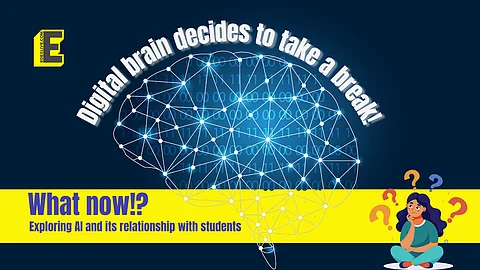

It was just another busy work day for Rudraksh Tigulla, a newly hired intern.
Stuck on a deadline, he turned to ChatGPT, his trusted Artificial Intelligence (AI) companion as always, when he suddenly saw an "error in message stream".
Like countless others, he panicked, and was restless for the rest of the day.
On Tuesday, June 10, ChatGPT crashed for over 10 hours, the longest outage in its history, leaving millions of users without access.
For many, this outage was more than just an inconvenience; it was a wake-up call.
Students who had grown accustomed to instant answers and creative prompts found themselves suddenly cut off. Memes and jokes flooded timelines.
"Is ChatGPT down for anyone else? I'm a cardiac surgeon in the middle of heart surgery," joked a user on X (formerly Twitter), @Sam0kayy
"ChatGPT is down how will I answer if someone asks me my name," quipped another user, @altaaaf10
While it might be entertaining to crack a joke or share a meme about it, the sheer amount of frenzy and anxiety caused by ChatGPT's crash is highly alarming, especially among students.
It reveals the extent to which students depend on AI to handle their everyday tasks.
"I don't rely entirely on ChatGPT; I can definitely think for myself," remarks Mohana Ramagiri, a final-year undergraduate.
But she agrees that ChatGPT is incredibly helpful in organising all resources in one place.
"For example, when I'm searching for colleges to apply to, instead of visiting each website individually, ChatGPT gathers the information I need and makes everything much easier," she comments.
Rudraksh concurs with her observation, highlighting ChatGPt's role as an essential tool for "giving a framework" he can build on, rather than doing his work for him.
"I don't currently have a fixed role at my firm. So I use AI to generate and schedule my tasks, turning its ideas into my initiatives for the company's benefit," he reflected.
But when the fruits of knowledge are at arm's length, there's no need to stretch for them anymore than absolutely required; consequently, laziness creeps in.
Mohana underscores students' increased reliance on ChatGPT for everything, "It is useful to some extent. But it's like people snap their fingers and command it to write their assignments, and it does."
She believes that it greatly reduces people's creativity, "No one wants to think because everything is at the tip of their fingers."
On the other hand, it is also interesting to see how AI helps students bring their visions to life.
"AI prompt engineering is becoming really popular. People are coming up with such creative prompts, and it's providing lots of jobs," said Mohana.
"ChatGPT can either support or limit creativity, depending on how it's used," added Rudraksh.
But he notes that if we had never dared to innovate, our world would still be stuck in the past.
Because if barren lands didn't turn into industries, cables didn't evolve into Wifi, and telegrams didn't turn into emails, our world would never have leapt forward.
At its heart, the question is whether the tool becomes a bridge to new ideas or a crutch that keeps us from walking on our own.
When the digital brain takes a break, do we pause with it, or do we discover that our own minds still have miles to go?
